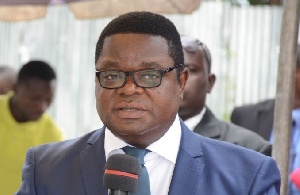- Home - News
- Elections 2024
- News Archive
- Crime & Punishment
- Politics
- Regional
- Editorial
- Health
- Ghanaians Abroad
- Tabloid
- Africa
- Religion
- Photo Archives
- Press Release
General News of Thursday, 22 May 2025
Source: www.ghanawebbers.com
Cedi appreciation driven by mixed domestic & global factors –Prof Quartey
Professor Peter Quartey on Cedi Appreciation
Professor Peter Quartey is the Director of the Institute of Statistical, Social and Economic Research (ISSER). He stated that the recent appreciation of the cedi results from various domestic and international factors.
He noted that while the cedi faced downward pressure, some domestic policies helped mitigate this decline. Prof. Quartey spoke during an interview with the Ghana News Agency after a two-day conference in Accra.
The conference was organized by the Merian Institute of Advanced Studies in Africa (MIASA). It focused on “Cash in Crisis in Africa: Navigating Financial Realities in Times of Disruption.” The aim was to explore how policy and governance frameworks affect cash circulation and accessibility.
Prof. Quartey highlighted the government’s Gold for Reserves program as a positive step. He said it helps cushion against global economic instability.
He mentioned improvements in fiscal discipline, indicating that the government is spending within its revenue limits. “If we were running an excessive deficit, we would have to borrow more,” he explained.
This borrowing would increase interest payments and pressure on the cedi, but he noted they are not doing that now. He praised improved coordination between the Ministry of Finance and the Bank of Ghana.
Prof. Quartey observed a more unified approach to economic management. He found that public engagement by the Bank of Ghana has increased confidence in the local currency.
He pointed out global tensions, especially trade dynamics between the U.S. and China, which weaken the US dollar. However, he remains optimistic about stabilizing global currency markets as tariff disputes ease.
He urged the government to maintain its current domestic strategies for stability in the cedi's value. “If we continue doing what we are doing domestically, we will see more stability,” he said.
Call for Inclusive Cashless Policies
In another development, Professor Quartey called for balanced policies as African countries move toward a cashless economy. He emphasized accommodating both cash and digital options for unbanked and marginalized groups.
He reiterated this point at MIASA’s conference on financial realities amid disruption. Prof. Quartey stressed that cash and digital payments should coexist for financial inclusivity.
He praised this theme as relevant to today’s policy discussions amid financial disruptions and digital transformation pushes. ISSER is collaborating with Innovation for Poverty Action (IPA) on significant strides in digital finance.
Currently, they fund 19 studies through the Gates Foundation across low- and middle-income countries like India and Ghana. These studies explore how commercial solutions can reach underserved populations effectively.
Highlighting mobile money growth, Prof. Quartey referenced a 2024 GSMA report showing 1.7 billion users globally—a 12% increase from last year. Agent networks in sub-Saharan Africa have also grown by 22% since 2002, totaling over 18 million agents.
“These figures underscore digital payments' rising importance,” he said while acknowledging challenges reaching underserved populations and rural communities.
By Hafsa Obeng
GNA











